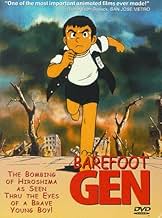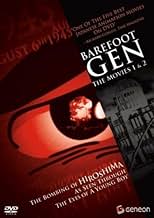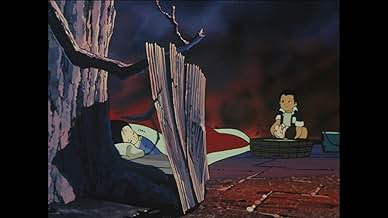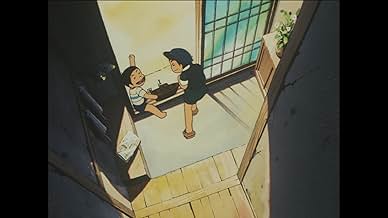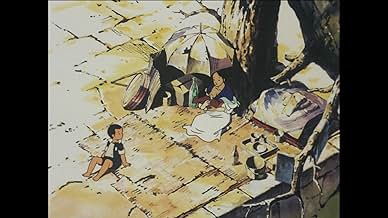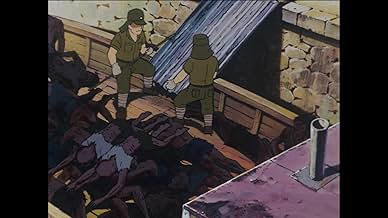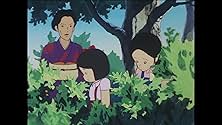A powerful statement against war, Barefoot Gen is a disturbing story about the effect of the atomic bomb on a boy's life and the lives of the Japanese people.A powerful statement against war, Barefoot Gen is a disturbing story about the effect of the atomic bomb on a boy's life and the lives of the Japanese people.A powerful statement against war, Barefoot Gen is a disturbing story about the effect of the atomic bomb on a boy's life and the lives of the Japanese people.
- Awards
- 1 win total
- Gen
- (voice)
- Gen (1995)
- (English version)
- (voice)
- Kimie
- (voice)
- Kimie (1995)
- (English version)
- (voice)
- Shinji
- (voice)
- …
- Shinji (1995)
- (English version)
- (voice)
- (as Brianne Siddal)
- Ryuta (1995)
- (English version)
- (voice)
- Daikichi
- (voice)
- Daikichi (1995)
- (English version)
- (voice)
- (as Kurk Thornton)
- Eiko
- (voice)
- Eiko (1995)
- (English version)
- (voice)
- Eizo
- (voice)
- Eizo
- (English version)
- (voice)
- (as Amike McConnohie)
- …
- Seiji
- (voice)
- Hana
- (voice)
- Pak
- (voice)
- Pak
- (English version)
- (voice)
- …
Featured reviews
As with Nosaka's "Grave of the Fireflies," Gen deals with a Japanese youth in the waning days of WW II. The first 30 minutes shows him to be typical for his stage of life, swinging between a self-centered boy and an adult. He is suddenly thrust into the position of head of the family after the Hiroshima bomb kills his father, brother, and sister, and destroys the city. The remainder of the movie deals with his transformation into an adult, with adult sensibilities and adult responsibilities.
Gen is clearly a Japanese story - the author, Nakazawa, lived through the event as a child. But the story could have taken place in Dresden or London just as easily. Although the atomic bomb is the event the movie revolves around, the story is really about the people - the children - and the effect the event has on their lives.
It's too bad that so much of the books had to be sacrificed to the time limits of a film. The novels delve much more deeply into the cruel society that Japan was in the 1940s. For example, much more was made of the neighbor's Korean background in the book; in the movie, you wouldn't realize the ethnicity if you didn't think about the name.
As a conventional film, Gen would probably be too honest to find real appeal in the U.S. Worse, the animation format will probably dissuade those who would otherwise see and appreciate it. Like most Japanese anime, this is not a "cartoon." It is a serious film in an unconventional - for the U.S. - medium.
The DVD transfer is excellent and belongs in your collection. This is a movie that continues to educate and enlighten with each viewing.
Animation styles are vastly different also. Grave was made in conjunction with Miyazaki of studio Ghibli (Totoro), and thus was very polished in appearance. Gen, on the other hand, has a mostly "old-fashioned" anime feeling, reminiscent of the "Golden Age of Anime" in the 80's, using devices that are very manga; overblown representations of runny noses and buckets of tears from characters, for example.
In the end, Hadashi no Gen should be on the shelf of every anime collector. When someone says to them that anime is "just for kids", pop this in the VCR and show them just how in-depth, heart wrenching and thought provoking simple pen and ink cells can become. You will have to watch it twice; it's hard to get all the nuances while wiping tears from your eyes.
I found this movie informative but disturbing. I have heard it being described as a tragicomedy. I think this is a fitting description but just be prepared because it really does make giant leaps from the genuinely tragic and sad to light heartedness. You won't know whether to laugh or cry. Actually, you will. A little cry would be totally justified so have a hanky at the ready and don't watch it with your mates from down the pub.
Did you know
- TriviaThe author of the "Barefoot Gen" manga, Keiji Nakazawa, said that 70% of the story is based on true events from his experience of the atomic bombing of Hiroshima.
- GoofsWhen Gen and Shinji take a big bite from a sweet potato from each end, they are then told by Eiko to give the sweet potato to their mother. Once the sweet potato is given to her, it is whole again.
- Quotes
Daikichi Nakaoka: This war can't be right. But it's only the cowards like me who dare say it. If there were only a few more like us. You know, sometimes it takes more courage not to fight than to fight, to not want to kill when all around you are calling out for blood. That's real courage in my book. If you boys remember nothing else I teach you, I hope you'll remember that.
- Crazy creditsThe closing credits run horizontally from the left side. Above the credits is footage of a paper boat lantern built sailing past multiple lanterns. After the boat has slowly vanished, the lanterns slowly turn into stars.
- Alternate versionsThere's a slightly different version of the movie on the website Rumble. Only one change has been applied to it which is the cut to the scene where Kimie (Gen's mom) finds a dead woman on the forest.
- ConnectionsFeatured in Gen d'Hiroshima 2 (1986)
- How long is Barefoot Gen?Powered by Alexa
Details
- Release date
- Country of origin
- Language
- Also known as
- Gen de los pies descalzos
- Production companies
- See more company credits at IMDbPro

